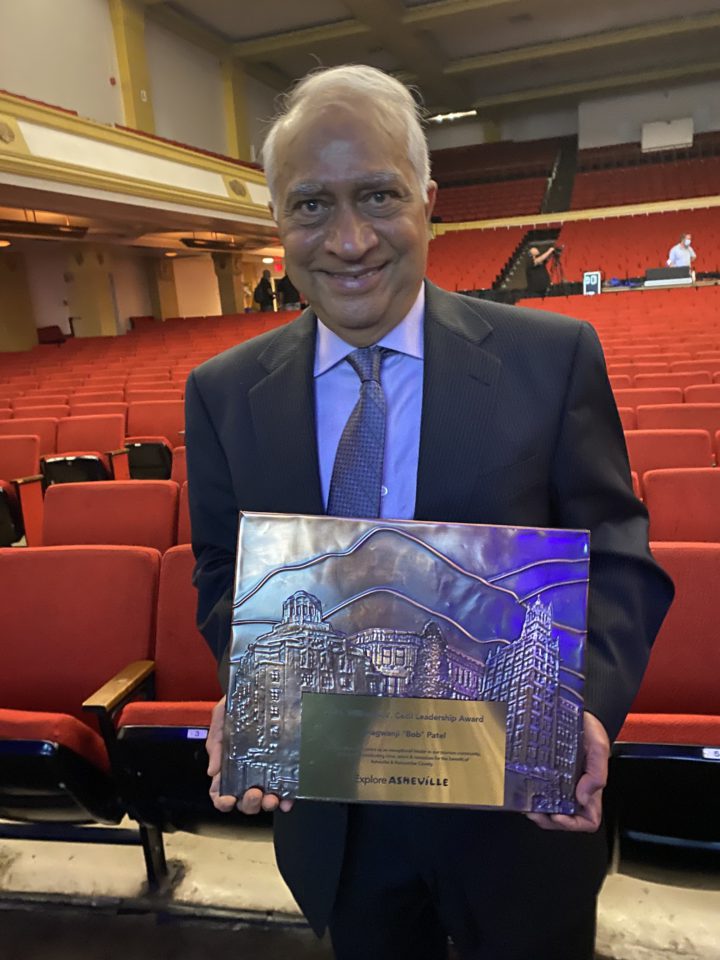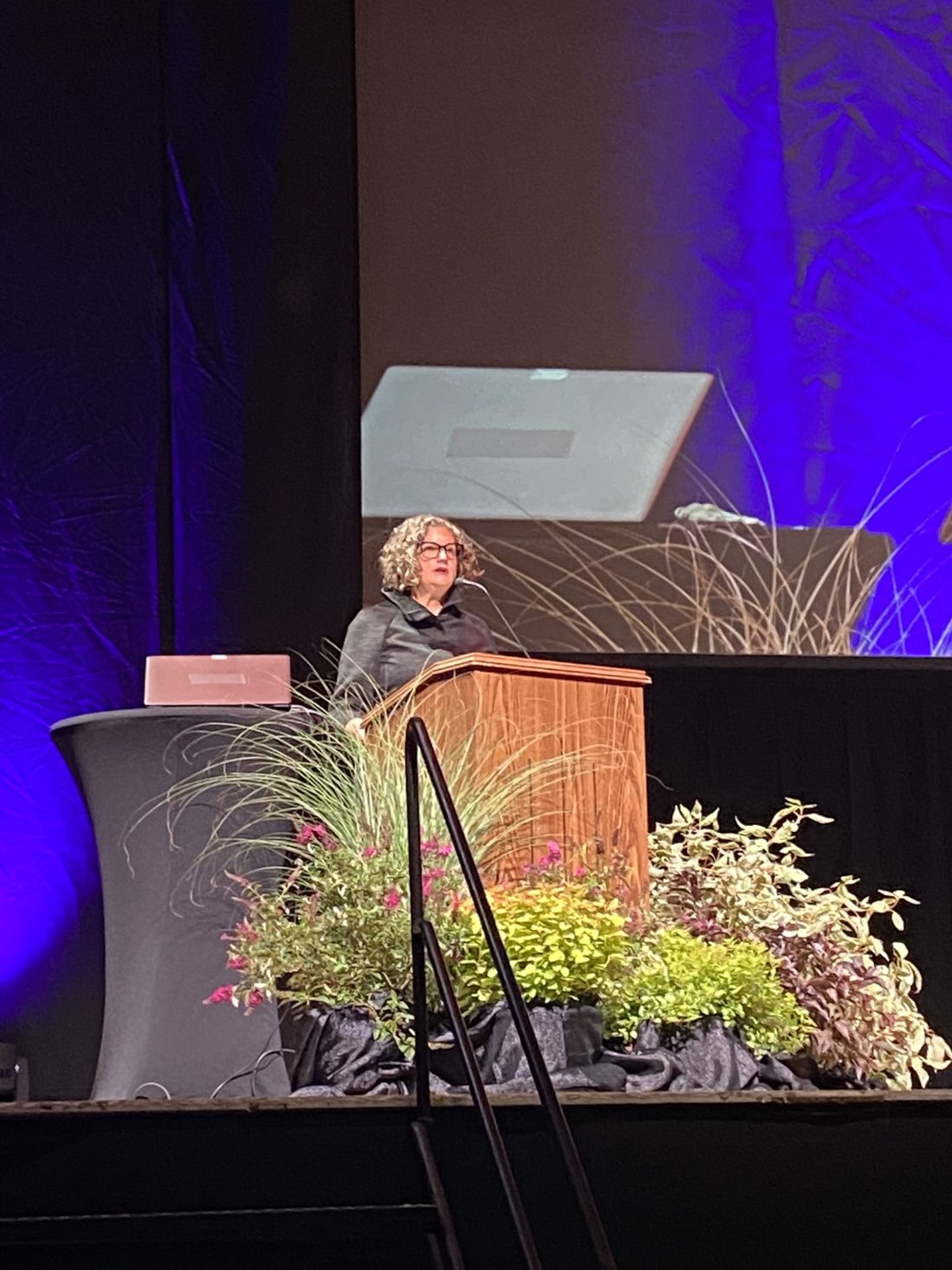The COVID-19 pandemic has been hard for the hospitality sector, an industry based on personal touch and warm greetings. But on Sept. 15, Asheville’s tourism leaders enjoyed a bit of both as they gathered for the Buncombe County Tourism Development Authority’s annual meeting. The event, hosted by the Explore Asheville Convention and Visitors Bureau and held at the Thomas Wolfe Auditorium in downtown Asheville, was the first large-scale, in-person event the authority has held in almost two years.
The evening’s theme, “The Heart of Hospitality,” aimed to highlight individual stories of locals working in Asheville’s tourism industry. The program opened with Asheville-based singer/songwriter Virtuous performing two songs on the auditorium’s stage, followed by remarks from Vic Isley, Explore Asheville’s president and CEO.
Isley detailed to about 180 masked attendees how the COVID-19 pandemic had impacted the BCTDA, tasked with boosting overnight room sales in Asheville and Buncombe County and managing the county’s occupancy taxes. Average yearly hotel occupancy, which in 2019 reached 83%, plummeted by more than 30 percentage points in fiscal year 2020-21, she said.
“We lost a decade in room demand growth,” Isley explained. “That means our hotel partners here with us today throughout the community dropped down to 2010 levels.”
But due to the county’s explosive growth in vacation rentals — and their associated occupancy tax revenues — the BCTDA’s balance sheet has remained relatively healthy. Demand for vacation rentals jumped 450% from 2016 to 2020, Isley noted, and overall lodging sales have exceeded 2019 levels for every month in 2021 through June (the latest for which data is available). In fiscal year 2020-21, vacation rental sales accounted for over 37% of all occupancy tax revenue and lodging sales, more than double their 15% share in fiscal year 2017-18.
“One of the reasons that our organization is on such a solid footing financially is the stellar performance of vacation rentals over the last year,” she said. “That’s good news for local residents who are earning incremental income from visitors returning to our area.”
Isley commended the Tourism Jobs Recovery Fund, a one-time pot of $5 million from the authority’s Tourism Product Development Fund to support emergency grants for local businesses impacted by the COVID-19 pandemic, for helping retain thousands of service industry and creative jobs in the city. Those workers, she suggested, have helped Asheville’s tourism sector recover at a faster rate than that of other destinations around the country.
Financial statements from an Aug. 25 BCTDA board meeting showed that occupancy tax revenue in June broke an all-time monthly record, with nearly $3.4 million collected. Lodging sales, which include hotels, motels and short-term vacation rentals, also hit a record in June at more than $56.4 million; the previous high-water mark of $53.8 million was set in October 2020.
In June, the BCTDA board approved a $20.3 million operating budget for fiscal year 2021-22, which included $15.3 million for advertising and public relations to draw visitors to the area. The allocation represents a 55% increase over the $9.7 million the agency spent on marketing during its previous budget cycle.
Following Isley’s presentation, motivational speaker Kevin Brown shared his personal experience of the potential for hospitality workers to make decades-long impressions on people they serve. The TDA’s chair, Kathleen Mosher, of The Biltmore Company, thanked the board’s former members and welcomed three newly appointed members: Michael Lusick, vice president of the Hospitality at FIRC Group, Inc that owns the Haywood Park Hotel; Matthew Lehman, who works as the general manager at Grand Bohemian Hotel Asheville; and Larry Crosby, who manages The Foundry Hotel.

The evening concluded with the presentation of the William A.V. Cecil Award to Bhagwanji “Bob” Patel of Virtelle Hospitality. In his acceptance speech, Patel referred to himself as an “accidental hotelier” who migrated from India to New York City in 1969 to pursue a career in engineering. Patel said that he bought his first hotel in Pensacola, Florida 1979, and then purchased a second hotel, this time in Asheville, in 1981.




There are two main reasons why the TDA is “on such a solid footing financially.” Reason one is that it already had a huge amount of money in the bank. Reason two is that it spent basically no money on marketing for 11 months of fiscal year 2020-21 for very obvious reasons. It would be in even better shape if it hadn’t chosen to spew $5.6 million on marketing in June to close out the fiscal year. To whom and why? It’s none of our business because the TDA is only accountable to itself. The visitor revenue numbers for the first half of 2021 tell us that Asheville-Buncombe doesn’t need a dime spent on marketing any more. Tourism? Developed.
Someone should have locked the doors of the Wolfe Auditorium until the TDA board agreed to some basic transparency and oversight.
“Someone should have locked the doors of the Wolfe Auditorium until the TDA board agreed to some basic transparency and oversight.”
I don’t even think that would have gotten the TDA to give a flip about the local community.
Vacation rentals provide 37% of income but still have no representation on the TDA Board? Why is that?